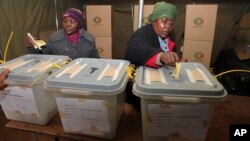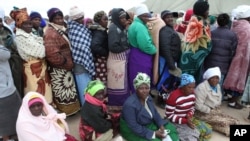JOHANNESBURG —
Millions of Zimbabweans are voting in a tense election pitting the octogenarian president against his archrival, the prime minister. Soon after polls opened, the opposition complained about voting irregularities.
It did not take long for Zimbabwe’s opposition to dispute the nation’s hotly contested presidential election.
Barely two hours after polls opened on Wednesday, the Movement for Democratic Change accused President Robert Mugabe’s ZANU-PF party of a litany of violations -- including tampering with the voter roll, intimidating opposition supporters and arresting activists. Rights groups and critics have made similar allegations in the run-up to the vote.
Their statement, in a way, encapsulates this election. Both sides have spent much more time slinging accusations at each other than they have debating issues. Issues such as land policy and economic plans have been largely overshadowed by repeated accusations from observers, opposition leaders and rights groups that Mugabe’s loyalists set up an uneven playing field by manipulating the voter roll, the security service and the state media.
Mugabe is running for president for the fifth time. At 89 years of age he is the oldest national leader in the world. He has led Zimbabwe since its independence in 1980. Under Zimbabwe’s new constitution, he is limited to two more five-year terms.
Mugabe told journalists on the eve of elections that he would step aside if he loses. But he added, with characteristic swagger, that he will not lose.
“If you join a competition where there are only two outcomes, you can’t be both. You either win or lose," said Mugabe. "If you lose then you must surrender to those who have won. And this is it. We will do so. Yes, comply with the rules.”
He is being challenged by Morgan Tsvangirai, who is running for the third time. He became prime minister after mediators pushed the two men into a power-sharing government after violent 2008 elections.
The MDC’s exiled treasurer, Roy Bennett, told VOA in Johannesburg that he does not expect Mugabe to play fair. But Bennett also says he does not think Zimbabweans will stand for another tainted election.
“It’s game over. You can play cards for a certain time until such time as the people realize where the issues lie. It’s the tipping point for Zimbabwe," said Bennett. "If this election is stolen, I guarantee you, as we sit here now, there will be a reaction from the people of Zimbabwe, a democratic reaction. They will come out in large numbers to protect their vote.”
Perhaps the most pivotal figure in the presidential race is one who is not going to win. Welshman Ncube split from Tsvangirai’s party in 2005, calling his version of the MDC the MDC-N, and has a sizeable following. The larger MDC has acknowledged that he might prevent one of the two main contenders from winning more than 50 percent of the vote. If that happens, a runoff vote will be held in September, with Ncube as kingmaker.
More than six million Zimbabweans were registered to vote in Wednesday's polls for president, parliament, and other offices.
The election commission has until August 5 to release the results.
It did not take long for Zimbabwe’s opposition to dispute the nation’s hotly contested presidential election.
Barely two hours after polls opened on Wednesday, the Movement for Democratic Change accused President Robert Mugabe’s ZANU-PF party of a litany of violations -- including tampering with the voter roll, intimidating opposition supporters and arresting activists. Rights groups and critics have made similar allegations in the run-up to the vote.
Their statement, in a way, encapsulates this election. Both sides have spent much more time slinging accusations at each other than they have debating issues. Issues such as land policy and economic plans have been largely overshadowed by repeated accusations from observers, opposition leaders and rights groups that Mugabe’s loyalists set up an uneven playing field by manipulating the voter roll, the security service and the state media.
Mugabe is running for president for the fifth time. At 89 years of age he is the oldest national leader in the world. He has led Zimbabwe since its independence in 1980. Under Zimbabwe’s new constitution, he is limited to two more five-year terms.
Mugabe told journalists on the eve of elections that he would step aside if he loses. But he added, with characteristic swagger, that he will not lose.
“If you join a competition where there are only two outcomes, you can’t be both. You either win or lose," said Mugabe. "If you lose then you must surrender to those who have won. And this is it. We will do so. Yes, comply with the rules.”
He is being challenged by Morgan Tsvangirai, who is running for the third time. He became prime minister after mediators pushed the two men into a power-sharing government after violent 2008 elections.
The MDC’s exiled treasurer, Roy Bennett, told VOA in Johannesburg that he does not expect Mugabe to play fair. But Bennett also says he does not think Zimbabweans will stand for another tainted election.
“It’s game over. You can play cards for a certain time until such time as the people realize where the issues lie. It’s the tipping point for Zimbabwe," said Bennett. "If this election is stolen, I guarantee you, as we sit here now, there will be a reaction from the people of Zimbabwe, a democratic reaction. They will come out in large numbers to protect their vote.”
Perhaps the most pivotal figure in the presidential race is one who is not going to win. Welshman Ncube split from Tsvangirai’s party in 2005, calling his version of the MDC the MDC-N, and has a sizeable following. The larger MDC has acknowledged that he might prevent one of the two main contenders from winning more than 50 percent of the vote. If that happens, a runoff vote will be held in September, with Ncube as kingmaker.
More than six million Zimbabweans were registered to vote in Wednesday's polls for president, parliament, and other offices.
The election commission has until August 5 to release the results.






